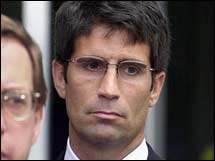 The NY Times’ Landon Thomas, Jr. — whose interesting article on former Merrill Lynch executive Nigerian Barge defendant Daniel Bayly was highlighted in this previous post — scores again today with this fascinating article on Michael J. Kopper, the former Enron executive who orchestrated along with with former Enron CFO Andrew Fastow the effective embezzlement of millions from Enron through the company’s transactions with special purpose entities (“SPE’s”) that the two controlled.
The NY Times’ Landon Thomas, Jr. — whose interesting article on former Merrill Lynch executive Nigerian Barge defendant Daniel Bayly was highlighted in this previous post — scores again today with this fascinating article on Michael J. Kopper, the former Enron executive who orchestrated along with with former Enron CFO Andrew Fastow the effective embezzlement of millions from Enron through the company’s transactions with special purpose entities (“SPE’s”) that the two controlled.
Despite Kopper’s role in orchestrating the embezzlement and the resulting breach of market trust that ultimately led to Enron’s demise into bankruptcy, Mr. Thomas notes that Kopper’s plea bargain with the Enron Task Force is likely to result in a relatively light prison sentence, perhaps even probation.
One has to wonder how former Enron chief accountant Richard Causey — who didn’t receive a penny from the tens of millions that Fastow and Kopper embezzled from Enron — feels about that turn of events. Larry Ribstein comments along those same lines here.
Given the societal bias against all things related to Enron, it’s easy to overlook the key role that Kopper had in Enron’s collapse. A good case can be made that the true criminal acts at Enron were limited to Fastow, Kopper and a relatively small group of their underlings who also profited from the transactions between Enron and the SPE’s that Fastow and Kopper controlled.
The original concept of the SPE’s — before Fastow and Kopper hijacked them — was actually sound and creative.
With equity owned primarily by investment banks and other financial institutions, the SPE’s were initially intended to be private equity funds with completely separate management from Enron. The main attraction of the SPE’s for investors was the funds’ preferred right to invest in Enron assets, which benefited Enron by allowing the company to preserve liquidity and hedge risk.
Former Enron treasurer Jeff McMahon — who often clashed with Fastow over Fastow’s machinations with the SPE’s and ultimately lost his treasurer’s position because of those clashes — recruited a bright investment banker from Bankers Trust in London named Michael Jakubik in 1998 to run the SPE’s.
However, after Jakubik had moved to Houston to take the position of running the equity funds, Fastow engineered a last-minute coup in which he installed Kopper in the position with the SPE’s intended for Jakubik and directed McMahon to put Jakubik in another position with Enron.
That set the stage for Fastow and Kopper’s embezzlement from Enron using the SPE’s, the public disclosure of which triggered the the breach of trust that caused the markets to turn on Enron.
Mr. Thomas’ colleague at the Times, Kurt Eichenwald does a good job of describing the foregoing events on pp. 194-219 of his book on the Enron scandal, Conspiracy of Fools (Broadway 2005).
